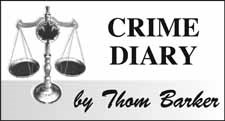As Parliament broke for the summer, one of the laws that received Royal assent was Alberta MP Blake Richards' private member's bill C-309 making it a crime to wear a mask during a riot or unlawful assembly.
Richards said he is proud to have identified a problem and created a solution according to CBC.
I really have to wonder, how much of a problem was this in the first place? My suspicion is that Richards has not so much identified a problem as manufactured one, a favourite practice of the Conservative Party to make it look like they're actually doing something other than wasting the time of legislators and the courts.
Of course civil rights activists, of which I suppose I am one, were immediately up in arms about this affront to the Constitution.
On closer examination, I don't think it really changes anything. The original section of the Criminal Code (Section 65, now renamed Section 65(1)) reads: "Every one who takes part in a riot is guilty of an indictable offence and liable to imprisonment for a term not exceeding two years."
Richards' bill adds the following as Section 65(2):
"Every person who commits an offence under subsection (1) while wearing a mask or other disguise to conceal their identity without lawful excuse is guilty of an indictable offence and liable to imprisonment for a term not exceeding 10 years."
So, you actually have charged with participating in the riot to be charged with wearing a disguise.
Back to my wasting time (and therefore taxpayer money) theory, that was already covered under Section 351 of the Code, which states: "Every one who, with intent to commit an indictable offence, has his face masked or coloured or is otherwise disguised is guilty of an indictable offence."
Richards said police told him it is virtually impossible to charge rioters under Section 351 because it was originally intended for use in armed robbery cases.
Frankly, that is simply bull. The language is perfectly clear, it does not say "with intent to commit armed robbery," it says, "with intent to commit an indictable offence." Rioting is an indictable offence. And although some judges have expressed the opinion that merely being present at a riot may technically constitute participation, in practice, prosecutors rarely charge those who have not actively engaged in overt criminal behaviour.
I think the fear engendered by opponents of this new Act, is perhaps somewhat over-the-top, but that is not to say Canadians should not be concerned about it.
What bothers me is the authoritarian tone of it. While I doubt it will ever see widespread use in the courts, will undoubtedly face constitutional challenges and may even be ultimately struck down, what it demonstrates is how out-of-touch our current government is with the very concept of civil liberties and its willingness to criminalize innocent and constitutionally-protected activities.
Other complaints about the law include the vagueness of the language, "conceal their identity without lawful excuse."
I don't have a serious problem with that. The Criminal Code contains all kinds of vagueness that is rightfully left to the courts to interpret. For example, in the sections preceding the new verbiage, unlawful assembly is defined as "an assembly of three or more persons who, with intent to carry out any common purpose, assemble in such a manner or so conduct themselves when they are assembled as to cause persons in the neighbourhood of the assembly to fear, on rea- sonable grounds, that they (a) will disturb the peace tumultuously; or (b) will by that assembly needlessly and without reasonable cause provoke other persons to disturb the peace tumultuously.
The potentially problematic language here is "on reasonable grounds" and "disturb the peace tumultuously."
While this terminology has broad connotations in general language, it becomes much narrower before the courts, which have consistently ruled an element of force or violence must exist to constitute an unlawful assembly or riot.
For example, a party at my neighbour's house that spills out into the street may disturb my peace (and may even violate a local noise ordinance or bylaw), but the Crown would be hard-pressed to make a "reasonable" case the party-goers were "tumultuously disturbing the peace" unless, of course, I asked them to keep the noise down and they started pelting my house with beer bottles.
The bottom line for me on this new Act is not that it makes an appreciable impact in practical terms on our freedom.
That's right, I am invoking the "it's the principle of the thing" clause.




